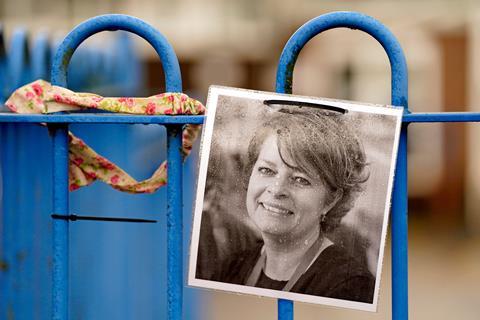Nick Megoran has interviewed dozens of teachers and church leaders in order to understand how we can better manage and motivate people in the workplace. As the suicide of head teacher, Ruth Perry, continues to cast a spotlight on Ofsted inspections, Nick argues that our theology of success needs to change

The tragic suicide of primary school headteacher, Ruth Perry, following a negative Ofsted inspection, has dominated headlines. But it has since emerged that she is far from the first teacher to have died as a result of stress caused by school inspections.
Ofsted has, however, so far resisted the widespread calls for a fundamental rethink of its work. Instead, it’s chief, Amanda Spielman, has proposed minor changes to the framework, such as offering staff “seminars to talk them through the process”.
We do what we can to be generous and self-giving - trying to walk that way of the Cross - not knowing outcomes
This fails to recognise that the problems with Ofsted – and many other metrics that measure employee ‘performance’ - run much deeper than a lack of understanding of what inspection entails, or staff not being supported through the process. At heart, they are theological questions about how we value (or devalue) people made in the image of God.
A human resource
The dominant way of thinking about people in the modern workplace, as ‘human resources’, emerged last century amongst an ideological group of American industrialists and academics. They viewed employees just like ‘natural resources’, best managed scientifically, using targets and annual reviews. The goal was to align workers’ attitudes and activities with the vision and strategy of their employer. But the idea ran into problems when it was transplanted into the public sector.
In the UK, the primary measure of a school’s success is its Ofsted rating. This has meant that teachers get managed as ‘resources’, tasked with hitting Ofsted targets. And the stakes are high; head teachers who excel are given extra resources, and are able to build mini-empires by taking over the running of weaker schools. Schools deemed to be failing are put into special measures, with senior staff often sacked.
Ofsted’s goal of improving quality is laudable. But managing by targets inevitably distorts teaching. A school’s energy becomes directed not towards providing the best education for the particular needs of its children, but towards ticking Ofsted’s boxes.
This can have terrible consequences for teachers. In the course of my research, I have interviewed dozens of teachers - and church leaders - about their experiences at work. Teachers repeatedly spoke about Ofsted inspections as among the most degrading aspects of their job.
One teacher I spoke to taught at a school rated by Ofsted as requiring improvement. A new head teacher was brought in, who, Andrew said, made improving the Ofsted score the school’s primary goal. The school “farmed children to get results,” with vulnerable kids side-lined, rather than being given the extra help they needed. Teachers “were treated like machines,” Andrew said, sacked in high numbers, and ended up demoralised and living in fear.
The strategy worked: at the next inspection, Ofsted rated them as outstanding. But the costs of treating people like resources, to be deployed to jump through Ofsted’s hoops, were high. Andrew was relieved to eventually leave the school and work elsewhere.
Made in God’s image
In contrast, the Bible sees people not as resources to be exploited in pursuit of someone else’s goals, but as created by God “in his own image” (Genesis 1:27). This was the core idea at the heart of Rev Martin Luther King’s life and work. In a 1965 sermon on this, King said: “The innate worth referred to in the phrase the ‘image of God’ is universally shared in equal portions by all…Every man must be respected because God loves him.” This has implications for the workplace, King insisted: “man is not a thing. He must be dealt with not as an ‘animated tool’, but as a person sacred in himself.”
The Bible sees people not as resources to be exploited but as created by God “in his own image”
What does this look like in practice? In my interviews, people spoke about audit and targets as dehumanising, but their opposite – trusting workers to get on with their jobs and follow their vocations – as humanity-affirming.
For example, Thomas, a church leader, told me about his experience of working in a deprived area near Andrew’s school. Despite encountering lots of opposition and violence, he set up a programme for young people. Eventually, he saw many lives touched and the whole attitude towards him reversed.
He commented, tellingly, that he likes working with churches because they are “in it for the long term…unlike the council, we don’t demand results in 18 months,” and “we do not have targets.” Instead, “we do what we can to be generous and self-giving - trying to walk that way of the cross - not knowing outcomes. It’s God who brings the transformation.”
Putting this into practice by modelling the treatment of workers in humanity-affirming ways is one of the great gifts the Church can offer our society at this time. Ofsted has produced a nightmare system that treats teachers as dispensable resources, rather than affirming their humanity as beings made in God’s image. Until it gets its theology right, our teachers and children will continue to suffer.






































No comments yet